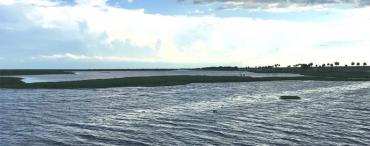
In weekend budget talks, lawmakers slashed funding for a key land and water conservation program vital to restoring Florida’s waterways.
According to legislative session monitors, the Florida Rural and Family Lands Protection Program (RFLPP) is a budget casualty.
This program not only has a 20-year track-record of success in preserving green space in perpetuity, it also keeps farmland on the tax rolls and plays a vital role in storing and cleaning water prior to it entering impaired water bodies.
Ranchers and environmentalists alike support this program. They say it may play an important role in dealing with South Florida’s algae challenges. Ranchlands can hold water for several months during the rainy season before it enters Lake Okeechobee, thereby helping to recharge the aquifer and filter water at the same time.
Funding for the RFLPP is eligible under the Amendment One Land & Legacy Trust Fund that Floridians supported by more than 70 percent. By voting for the amendment, Florida citizens demonstrated their overwhelming understanding and support for preserving land for multi-generations as a tool to protect Florida from unbridled growth. Land owners and environmental advocates laud the program for the many benefits it provides.
In many cases, the cost to the land owner in managing the land, controlling invasive species and implementing BMPs is more than the landowner is provided by the government for the conservation easement. The process to get lands enrolled in the program sometimes takes multiple years and is rigorous to assure that taxpayer dollars are spent wisely.
According to incoming president of the Florida Cattlemen’s Association Matt Pearce, there are more than 200 parcels ready to go into conservation easements if the funding is appropriated. He fears the money is being sidelined as part of “politics” rather than any issues of the merits of the program. Pearce spoke to AgNet Media this weekend as he and his conservation colleagues continue trying to reach lawmakers in the final days of the Legislature:
The Nature Conservancy also is a vocal proponent of the RFLPP, recognizing the environmental values derived from the program. Garrett Wallace, government relations manager for the Nature Conservancy of Florida, says the conservation easements provided through RFLPP funds not only hold and treat water, but they attenuate flows that other, more intensive land uses are not suitable for. Wallace shared his thoughts about the budget process in a weekend interview with AgNet Media.
Wallace describes from firsthand experience how conservation easements like those provided through the RFLPP have real funding advantages to local governments while also providing many other benefits that his organization strongly supports.
Julie Morris represents the National Wildlife Refuge Association and has been a strong advocate of the RFLPP for many years. In a weekend interview for this report, she discusses some of the partnering monies from many other funding partners that will also be lost if the state doesn’t step up with funding to allow the Military and many other partners to continue their participation.
Cattlemen and other conservationists were concerned enough about the economic viability of the program that they passed the hat to have the YouTube video displayed above produced in the final days of the Legislature. They hope it might help reach and educate lawmakers with a call to action.
Gary Cooper is the founder and president of AgNet Media, Inc., based in Gainesville. This report is reproduced in Sunshine State News with Cooper's permission.


